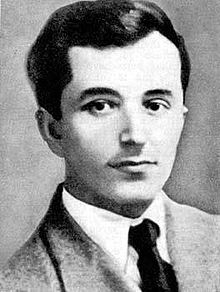Avni Rustemi

Avni Rustemi (born September 26, 1895 in Libohova , † April 22, 1924 in Tirana ) was an Albanian educator who first became famous as an assassin, then as a politician. His assassination sparked uprisings in Albania that led to an upheaval, the June Revolution .
Life and political activity
After attending various schools in Albania, which belonged to the Ottoman Empire until 1912 , Rustemi studied pedagogy , including in Rome . After the First World War , he first returned to Albania.
Large parts of his country were then occupied by Greek , Yugoslav and Italian troops, and the government formed at the Lushnja Congress in January 1920 had to fight for recognition of their country at the Paris Peace Conference . To support the Albanian struggle for independence, patriotic societies were formed in various cities , most of which consisted of younger middle-class people and who wanted to create the basis for an Albanian national consciousness through cultural work. The call for equal rights for Albanian women came from their circles for the first time. Rustemi should in 1918 Vlora one of these companies ( Djalëria e Vlorës ) have connected.
Albania's efforts to gain recognition were thwarted by Essad Pasha , who posed as a representative of Albania at the Paris conference and supported troops in the country who were loyal to him. On June 13, 1920, Rustemi shot Essad in front of his Paris hotel and then turned himself in to the police. This act made him popular suddenly. Numerous local administrations, patriotic associations and political assemblies in Albania petitioned French authorities and politicians asking them to release Rustemi. During his trial, which took place in Paris on November 30th and December 1st, 1920, he claimed to have shot and killed Essad Pasha in affect for his countless crimes against Albania. The court, which said it had no knowledge of what was going on in Albania, acquitted him. Rustemi returned to his homeland as a national hero, which was now internationally recognized when it was accepted into the League of Nations .
Rustemi now tried to merge the patriotic societies into an umbrella organization. This was founded with the name Federata Atdheu (Fatherland) in April 1921 in Vlora; Rustemi received the honorary chairmanship. In its program, the association declared war on harmful, outdated traditions - it wanted to establish educational and cultural institutions, publish a magazine and promote health care. Societies for the economic development of the country should be supported by the association, which called for an agricultural bank for the farmers. The members committed themselves to strict nonviolence, the association did not want to give political statements. Most of its members belonged to the middle class of central and southern Albania. Due to his reputation, Rustemi was appointed to a three-member commission at the end of 1921, which was supposed to solve a government crisis, but failed. A year later, the successor government dominated by Interior Minister Ahmet Zogu dissolved the association. As a successor organization, Rustemi then founded the Bashkimi (Union) association in October 1922 . At the end of 1923 he was elected to the new Albanian parliament as a representative of the Kosova prefecture . In February 1924 there was a violent exchange of words about minutes of silence for foreign heads of state. Rustemi advocated including Vladimir Ilyich Lenin in addition to Woodrow Wilson , because he had prevented a partition of Albania with the publication of the London secret agreement . But he distanced himself from communism .
Assassination attempt on Essad Pasha Toptani
On May 21, 1920 Avni Rustemi traveled to Rome and from there to Paris. Three weeks later, on June 13, 1920, he shot Essad Pasha Toptani twice in the back while Toptani was walking out of a Parisian restaurant. Rustemi was being held by pedestrians and hotel staff until the police could arrest him.
Avni Rustemi was acquitted on December 2nd in France and traveled back to Rome.
Albanian historians give patriotic motives for the murder. The act made Rustemi very popular in Albania, as many Albanians viewed Essad Pasha's cooperation with the Montenegrins, Turkish Ottomans and Serbs as treason. Historically, it was a signal for a revolution of the citizens and peasants, against the feudal traditions of Albania and a bridge to the subsequent democratic reform government Fan Noli , in the June revolution of 1924.
Assassination attempt on Avni Rustemi
On April 20, 1924, he was shot in Durres Street in Tirana by Jusuf Reçi, an agent of Ahmet Zogu , and died of his wounds two days later. His funeral in Vlorë on April 30 was widely attended.
See also
literature
- Mihallaq Pela, Hidajete Luga (Ed.): Avni Rustemi. Patriot i madh - democrat revolucionar . 8 Nëntori, Tirana 1974, (source and document collection).
- Michael Schmidt-Neke: Development and expansion of the royal dictatorship in Albania (1912–1939). Formation of government, mode of rule and power elite in a young Balkan state . Oldenbourg, Munich 1987, ISBN 3-486-54321-0 , ( Southeast European Works 84).
- Miranda Vickers: The Albanians. A modern history. Tauris, London et al. 1995, ISBN 1-85043-749-1 .
- Kastriot Dervishi: Historitë e përgjakjes së politikanëve shqiptarë, Shtëpia Botuese "55" , 2008.
- Lefter Dilo: Avni Rustemi , Shtëpia Botuese "8 Nëntori", 1978 1
| personal data | |
|---|---|
| SURNAME | Rustemi, Avni |
| BRIEF DESCRIPTION | Albanian educator, assassin and politician |
| DATE OF BIRTH | September 26, 1895 |
| PLACE OF BIRTH | Libohova |
| DATE OF DEATH | April 22, 1924 |
| Place of death | Tirana |

